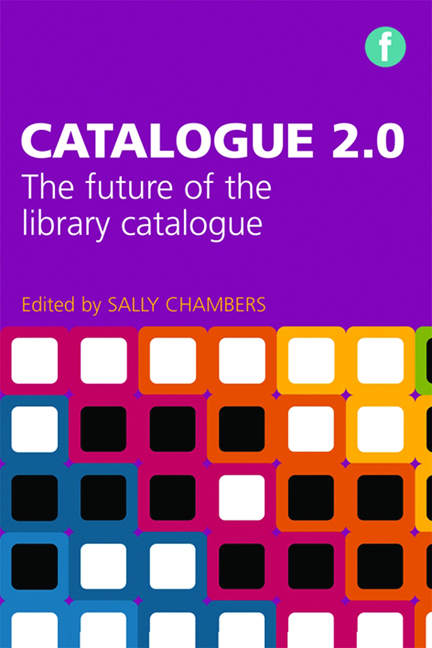Book contents
- Frontmatter
- Dedication
- Contents
- Acknowledgements
- Foreword
- Introduction
- Editor and contributor
- 1 Next-generation catalogues: what do users think?
- 2 Making search work for the library user
- 3 Next-generation discovery: an overview of the European scene
- 4 The mobile library catalogue
- 5 FRBRizing your catalogue: the facets of FRBR
- 6 Enabling your catalogue for the Semantic Web
- 7 Supporting digital scholarship: bibliographic control, library co-operatives and open access repositories
- 8 Thirteen ways of looking at libraries, discovery and the catalogue: scale, workflow, attention
- Index
3 - Next-generation discovery: an overview of the European scene
Published online by Cambridge University Press: 08 June 2018
- Frontmatter
- Dedication
- Contents
- Acknowledgements
- Foreword
- Introduction
- Editor and contributor
- 1 Next-generation catalogues: what do users think?
- 2 Making search work for the library user
- 3 Next-generation discovery: an overview of the European scene
- 4 The mobile library catalogue
- 5 FRBRizing your catalogue: the facets of FRBR
- 6 Enabling your catalogue for the Semantic Web
- 7 Supporting digital scholarship: bibliographic control, library co-operatives and open access repositories
- 8 Thirteen ways of looking at libraries, discovery and the catalogue: scale, workflow, attention
- Index
Summary
Introduction
Dissatisfaction with the online catalogues delivered as part of the library management system sparked the emergence of a new genre of products and services that focus entirely on providing an improved experience in the way that libraries provide access to their collections and services. One of the major trends of this phase of library automation involves a separation between the library management system that provides automation support for the internal operations, such as cataloguing, circulation, serials management and new material acquisitions, from the presentation layer facing the users of the library. In this age of decoupled systems, a variety of commercial products and services, as well as projects taken on by library organizations, now find use in many libraries throughout the world.
In this chapter we will provide a brief overview of the features and general characteristics of this new genre of library software, focusing on the products that have been deployed or developed in the United Kingdom and other parts of Europe. Some of these projects include adoption of commercial products from international vendors such as Serials Solutions, EBSCO, Ex Libris and OCLC and others involve locally developed software or implementation of open source products.
Features and services
These new catalogue products, or discovery services as they are more commonly known, embrace a more robust approach to interfaces, to content and to service delivery. In these times, where most library users use the web for a wide array of daily activities, it is essential for libraries to provide interfaces that follow the conventions and meet expectations set by other successful destinations on the web. Libraries need to make dramatic improvements in the way that they provide access to their collections and deliver their services, as the current library systems in use reflect an earlier phase of the rapidly evolving history of the web.
These newgeneration library discovery services aim to follow the interface conventions that have become well established in the mainstream of the web. Ecommerce and social networking sites employ features that allow individuals to easily navigate through enormous quantities of information and take advantage of any services offered.
- Type
- Chapter
- Information
- Catalogue 2.0The future of the library catalogue, pp. 37 - 64Publisher: FacetPrint publication year: 2013
- 1
- Cited by



